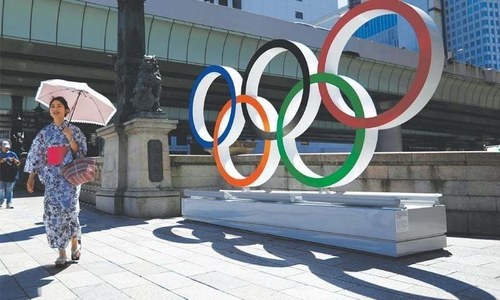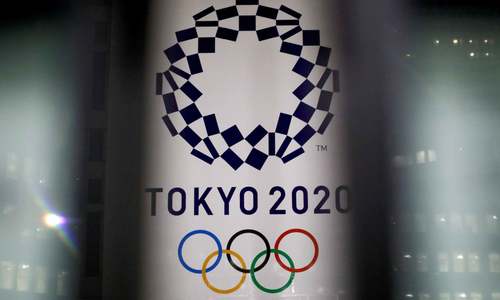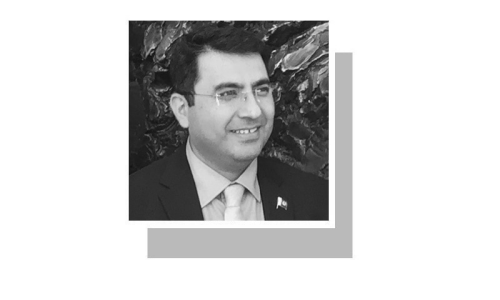TOKYO: The Tokyo Olympics, already delayed by the pandemic, are not looking like much fun: Not for athletes. Not for fans. And not for the Japanese public.
They are caught between concerns about the coronavirus at a time when few are vaccinated on one side and politicians who hope to save face by holding the Games and the International Olympic Committee with billions of dollars on the line on the other.
Japan is famous for running on consensus. But the decision to proceed with the Olympics and this week to permit some fans, if only locals, has shredded it.
Support for going ahead seems to be increasing, but there’s persistent opposition with small street protests on Wednesday, one month before the July 23 opening.
Much of that concern stems from qualms about the health risks. While the number of new cases has been receding in Tokyo, only about 7 per cent of Japanese are fully vaccinated and even though the government is now supercharging its vaccine drive after a slow start, the vast majority of the population still won’t be immunised when the Games start.
Before the postponement 15 months ago, Japan was on track to host a well-run if expensive Olympics. But now, worries that the Games will be become an incubator for the virus hang over them.
Compounding those worries, a second member of Team Uganda, an athlete, has tested positive after being given a clean bill of health just days ago upon arrival in Japan.
While the Games may still end up wowing television audiences who will tune in around the world, the pandemic has removed any sense of celebration. Athletes are meant to stay in the village or venues. Most others entering Japan for the Olympics can only shuttle between their hotels and venues for the first 14 days, must sign a pledge of follow the rules, and could have their movements monitored by GPS.
There will be no public viewing areas in Tokyo. The few fans who can attend venues must wear masks, social distance, refrain from cheering, and go straight home afterward.
In perhaps a last-ditch effort to save some of the festive spirit, organisers said on Tuesday they were looking into selling alcohol at the venues.
But after immediate pushback, organising committee president Seiko Hashimoto reversed the decision at a Wednesday news conference.
“We decided as Tokyo 2020 not to sell alcoholic beverages and to ban drinking alcoholic beverages in the venues,” she said.
And athletes who might want a drink to celebrate have been told by organisers to “drink alone” in their rooms.
Alcohol is otherwise banned in the athletes’ village.
High-fives, talking loudly and autographs will also be banned for the reduced numbers of Olympic ticket holders allowed into venues as organisers conceded a “sense of celebration” will be limited at the Games.
Hashimoto warned festivities “will have to be suppressed” to keep the Games safe, and conceded that organisers will need to be “creative” to stoke a party atmosphere.
Games chiefs decided on Monday to allow up to 10,000 spectators into competition venues, but Hashimoto warned them not to expect the kind of festival mood currently being enjoyed by football fans at Euro 2020.
“In Europe, the venues are filled with celebration,” she said. “Unfortunately, we may not be able to do the same.”
Fans are forbidden from cheering or “making direct contact with other spectators”. Asking athletes for autographs or “expressing verbal support” is also a no-no, as is waving a towel or any form of cheering that could create a crowd”.
“The festive mood will have to be suppressed — that has become a major challenge,” Hashimoto said. “People can feel joy in their hearts, but they can’t be loud and they have to avoid crowds. Those are the areas where we need to be creative, and we are putting in a lot of effort to come up with a new way of celebrating.”
Japanese medical experts have said banning spectators is the least risky option but also given recommendations on how best to host the Games if spectators are admitted. Spectators from overseas have already been barred.
Organisers said on Wednesday they would decide on whether to allow spectators at night sessions, taking infections into account, by July 12 when virus curbs are due to be lifted in Tokyo and some other areas.
Prime Minister Yoshihide Suga has still not ruled out holding the Games without spectators if Tokyo is put back under a state of emergency, from which it only emerged on June 21.
The positive test for the Ugandan athlete followed a positive test for a coach upon arrival in Japan on Saturday, and after the rest of the delegation were quarantined.
Their cases underscore the challenges ahead for organisers to make the Games safe, with daily testing of athletes, who will be confined to a “bubble” and kept away from the public.
The second positive test was announced by the team’s host city Izumisano in western Japan, confirming the rest of Team Uganda and a local city official who accompanied them from the country were close contacts.
Published in Dawn, June 24th, 2021















































